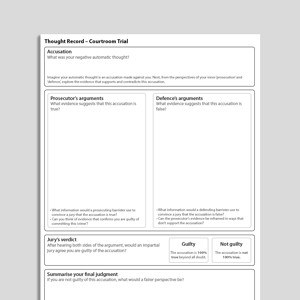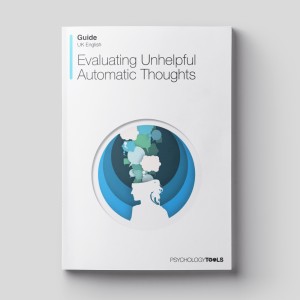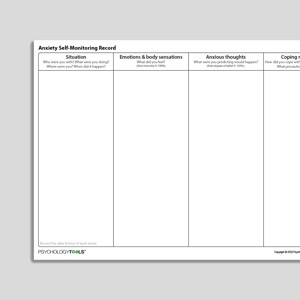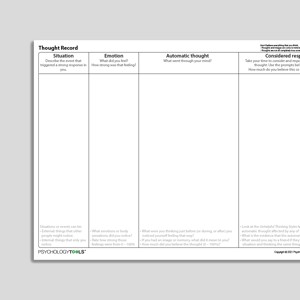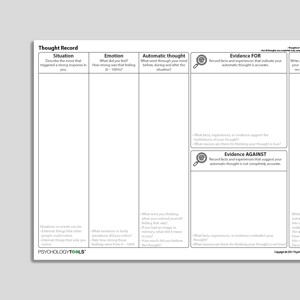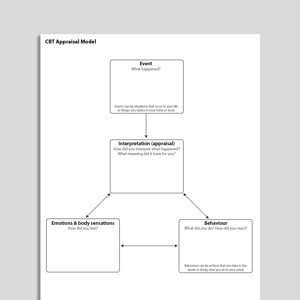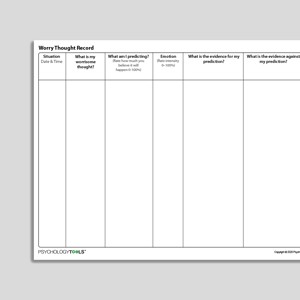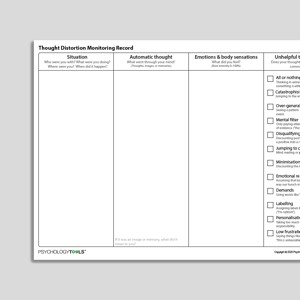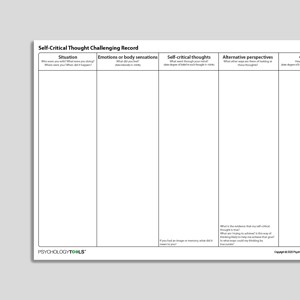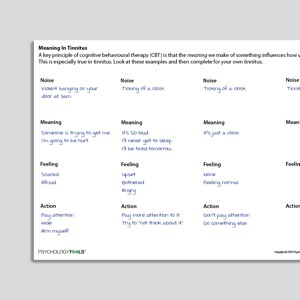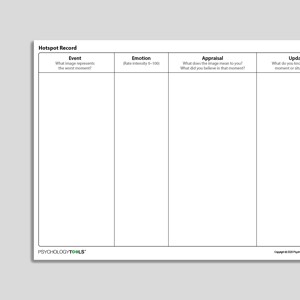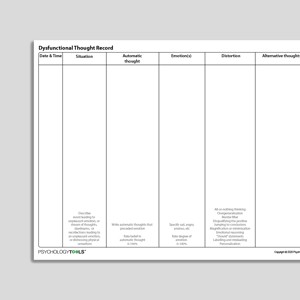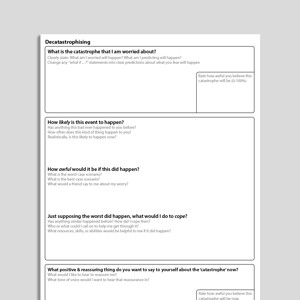Thought Records
The cognitive model assumes that cognitions (thoughts and images) are responsible for emotions. Cognitions are automatic, habitual, and believable. Unfortunately, they are also prone to bias: misappraisals of events and situations underpin many common problems, including anxiety and depression. Thought records are tools used by cognitive behavioral therapists to help their patients capture, evaluate, and restructure their negative automatic thoughts. Recording and evaluating thoughts allows us to test the accuracy of our thinking, and oftentimes feel better by identifying and correcting bias or inaccuracies. One objective when using thought records in CBT is to encourage more balanced thinking. Thought records vary considerably and include: simple forms that assist patients to capture their negative automatic thoughts; thought challenging records that guide patients through the process of disputing their negative cognitions; and disorder-specific forms that encourage the capture of specific types of cognitive content. Psychology Tools has created a variety of thought records to suit the needs of a broad range of cognitive therapists.
Cognitive Distortions – Self-Monitoring Record
Cognitive Distortions – Self-Monitoring Record
Examining Your Negative Thoughts
Examining Your Negative Thoughts
Prompts For Challenging Your Negative Thinking
Prompts For Challenging Your Negative Thinking
Cognitive Distortions – Unhelpful Thinking Styles (Extended)
Cognitive Distortions – Unhelpful Thinking Styles (Extended)
Urges – Self-Monitoring Record
Urges – Self-Monitoring Record
Permissive Thinking – Self-Monitoring Record
Permissive Thinking – Self-Monitoring Record
Thought Record – Courtroom Trial
Thought Record – Courtroom Trial
Evaluating Unhelpful Automatic Thoughts
Perfectionism Self-Monitoring Record
Perfectionism Self-Monitoring Record
Self-Monitoring Record (Universal)
Self-Monitoring Record (Universal)
Anxiety - Self-Monitoring Record
Anxiety - Self-Monitoring Record
Boundaries - Self-Monitoring Record
Boundaries - Self-Monitoring Record
Flashbacks - Self-Monitoring Record
Flashbacks - Self-Monitoring Record
Health Anxiety - Self-Monitoring Record
Health Anxiety - Self-Monitoring Record
Dissociation - Self-Monitoring Record
Dissociation - Self-Monitoring Record
Depression - Self-Monitoring Record
Depression - Self-Monitoring Record
Attention - Self-Monitoring Record
Attention - Self-Monitoring Record
Self-Criticism - Self-Monitoring Record
Self-Criticism - Self-Monitoring Record
Anger - Self-Monitoring Record
Anger - Self-Monitoring Record
Rumination - Self-Monitoring Record
Rumination - Self-Monitoring Record
Negative Thoughts - Self-Monitoring Record
Negative Thoughts - Self-Monitoring Record
Thought Record (Considered Response)
Thought Record (Considered Response)
Thought Record (Evidence For And Against)
Thought Record (Evidence For And Against)
Thoughts In CBT (Psychology Tools For Living Well)
Thoughts In CBT (Psychology Tools For Living Well)
Challenging Your Negative Thinking (Archived)
Challenging Your Negative Thinking (Archived)
Unhelpful Thinking Styles (Archived)
Unhelpful Thinking Styles (Archived)
Thought Distortion Monitoring Record (Archived)
Thought Distortion Monitoring Record (Archived)
Simple Thought Challenging Record
Simple Thought Challenging Record
Self Critical Thought Challenging Record
Self Critical Thought Challenging Record
Prompts For Challenging Negative Thinking (Archived)
Prompts For Challenging Negative Thinking (Archived)
Identifying The Meaning Of Body Sensations
Identifying The Meaning Of Body Sensations
Court Trial Thought Challenging Record (Archived)
Court Trial Thought Challenging Record (Archived)
Links to external resources
Psychology Tools makes every effort to check external links and review their content. However, we are not responsible for the quality or content of external links and cannot guarantee that these links will work all of the time.
Recommended Reading
- Bennett-Levy, J. (2003). Mechanisms of change in cognitive therapy: The case of automatic thought records and behavioural experiments.Behavioural and Cognitive Psychotherapy,31(3), 261-277.
What Are CBT Thought Records?
Types of CBT Thought Records
Self-monitoring records are a simple form of thought record. They are often used to gather information about thoughts in the context of a particular situation, as well as exploring any emotions elicited, and any coping responses (behaviors). Self-monitoring records enable a clinician to gather information relevant for a cross-sectional formulation.
Thought-challenging records, often just called thought records, are used to help people to evaluate their automatic thoughts or to dispute their negative thinking. Thought records exist in numerous different formats: popular methods involve training users to identify the presence of cognitive distortions, or to evaluate the evidence for and against a negative automatic thought.
Disorder-specific thought records are used to gather information relevant to a particular condition. For example, patients prone to worry might be encouraged to focus on the automatic predictions they make, and clients with health anxiety might be encouraged to focus on negative thoughts relating to their health.
References
Beck, A. T., Rush, A. J., Shaw, B. F., & Emery, G. (1979). Cognitive therapy of depression. New York: Guilford Press.







